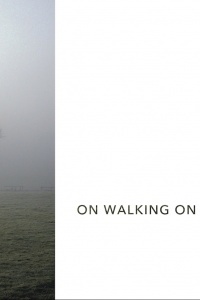On Walking On
On Walking On, by Cole Swensen.
Nightboat Books, 2017,
120 pages, paper, $16.95,
ISBN: 978-1-937658-66-3
Literary history is replete with writers who walked and who wrote about walking, from early pilgrimage accounts to contemporary records. Cole Swensen tackles this voluminous history in a book of poems about many such writers, interspersed with prose poems regarding walks of her own. The volume is organized loosely chronologically — beginning with Chaucer and ending with contemporary writers Iain Sinclair and Will Self — and it contains longer poetic sequences about the work of Rousseau, Thoreau, Sand, Woolf, Walser, Sebald, and poet Lisa Robertson.
They represent only a small sampling of the writers touched on here, however, which also include Wordsworth (Dorothy and William both), De Quincey, Dickens, Nirval, Humbolt, Muir, Breton, Debord, Burkhart, Herzog, Mullen, and more.
The poems operate as micro-essays on the work and interests of each walking writer. As in the longer poem, “Rousseau,” they frequently begin with a third-person description:
For Rousseau walking was a solitary breech of a rift of sky
drifting to a gate. And the gate swung shut . . .
These seeming didactics break down as Swensen shifts to the first person, and her fractured syntax leads us to wander the lines searchingly — is this the named writer or the poet herself now speaking? Regardless, the effect is one of a sort of breathless instructional:
. . . Turned around fast enough to make the trees run
in the night, rather warm. And why not go on?
The first walk: the first line: that so alone am I who loved
so is walking
always walking toward. I saw myself in shards. The drift that drives
the eye into time. . . .
The relationship of the walked line to the written one is clear in many of the poems; breath plays a role, as does rhythm. In “Rousseau,” the ways in which the hand makes a written line on the page are shown as akin to the walker’s passage across the landscape, and revealed through the rhythm and scrawl and “loping slant” of the body:
Any walk Rousseau once said is endless where the wild
might seem
to have a name undone from within the unanswered f law
written out
by hand. The entire text of what is now known as The
Reveries of a Solitary Walker
was found scrawled and the hand goes on, has its own
hundreds of miles to
go.
Many writers have found the “wild” in themselves, and these revelations are exposed beautifully in the poems. In particular, we learn from Swensen about Thoreau’s concept of wildness “as a door within most animate things.” Thoreau used the word “wild,” she tells us, “not as an adjective but as an exile /sifting an estranged country through overhanging leaves.” This leads us in further understanding, too, about being lost, and the wild becomes “a noun because it was /a sovereign, concrete thing, a thing you could hold, vastly alone, //into a moving part somewhere //in the body . . . ”
To hold the wild in the body is to find the vastness — and strangeness — of the self. George “Sand walked /as a way of painting a landscape in and of the mind outside.” This route for her, as for so many of these writers, is an ecstatic one, a place of abandon where broken open; “dissolved of body,” the walker becomes inseparable from the space and path she walks. Distance is understood then to travel two directions, out into the world and deep into the self. In Thoreau: “Walking,” “‘Difference and distance are one’ all our lives //to find ourselves surrounded by strangers if we have truly lived.”
To what end, this distance and estrangement? “The myth of the wanderer is common to all cultures, the one who, never //quite placed, harbors. To be lost is a stranger,” notes Swensen in Walser. But to be lost and a stranger is also to be vulnerable, porous, open to exchange. Replete with such exchanges, and the moments of shattering that make them, the poems of On Walking On navigate this boundary between self and the world. Shards break apart, ref lecting light; in ecstasy we step beside ourselves, undone, along with our understanding of what we see and know. To be a stranger to the self requires receptivity, a condition that walking — and writing — perhaps encourages. For Sand — and for Swensen — “holding the unraveling edge,” it seems such alterity is required of this life:
It is my job to be a stranger, and I repeat the words
“vast” and “immense” in order to remain so.
— Julie Poitras Santos


